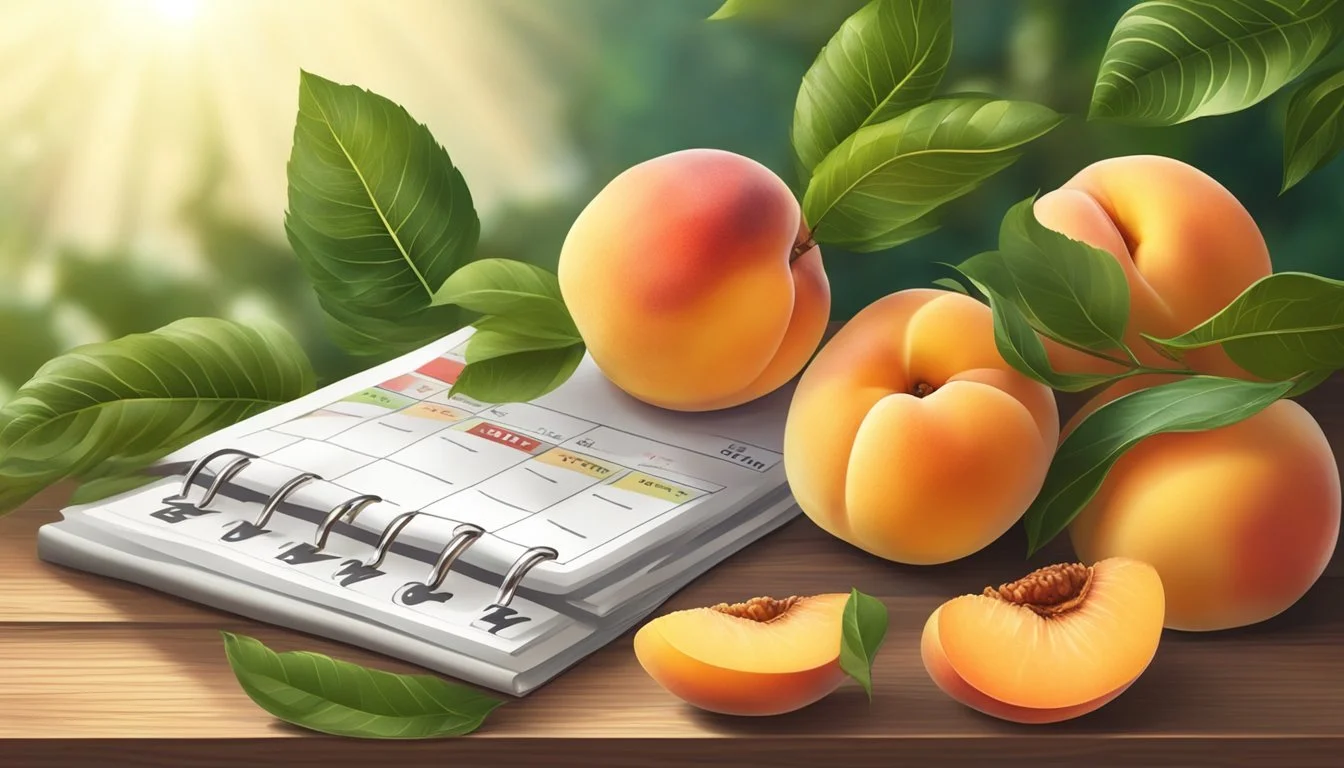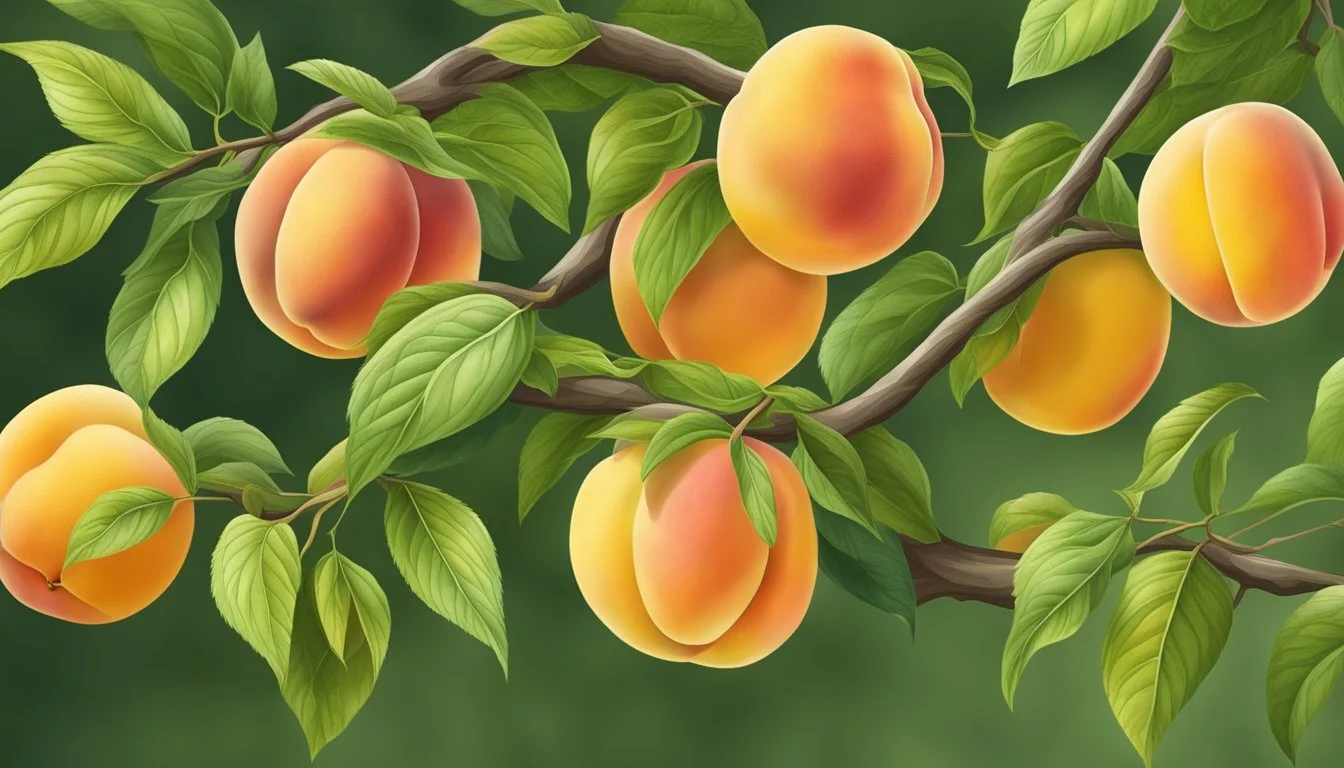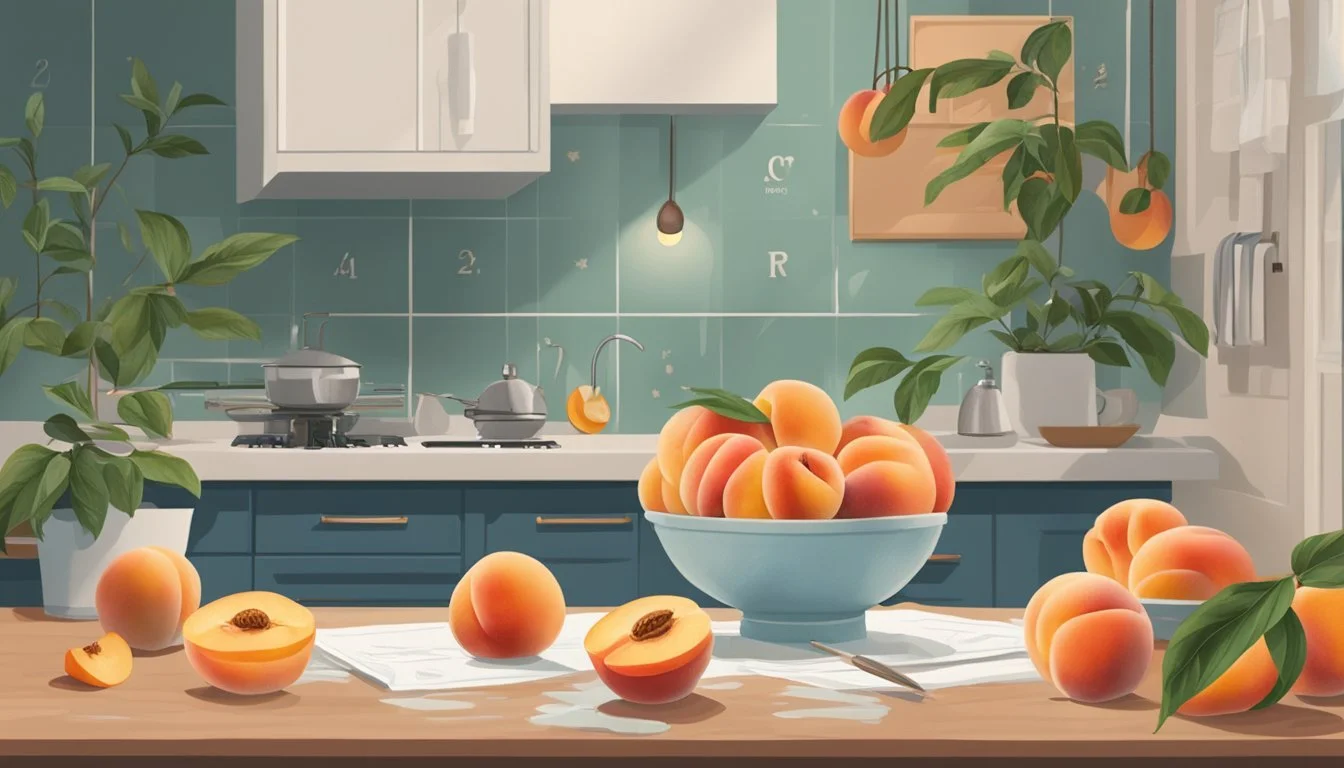How Long Do Peaches Last?
Understanding Shelf Life and Storage Tips
Peaches are a beloved summer fruit, celebrated for their juicy sweetness. However, unlike some fruits that have a more extended shelf life, peaches are known for their relatively short freshness window. Typically, they last around 1 to 2 days at room temperature once they are ripe. If refrigeration is utilized, this window is extended, and ripe peaches can last for approximately 5 to 7 days.
The duration for which peaches remain good to eat also depends on their ripeness at the time of purchase. Unripe peaches can take 1 to 3 days to ripen at room temperature. It's important to note that if peaches are stored improperly or kept beyond their optimal time frame, they can lose their texture and flavor, or worse, become spoiled.
For those not planning to consume their peaches within these time frames, freezing offers a longer-term storage solution. When properly prepared and frozen, peaches can be preserved for six to twelve months. This method involves washing, slicing, and storing the peaches in airtight containers, making them a year-round delight.
Understanding Peaches
Peaches are a juicy and delicious fruit with various varieties and significant nutritional value. They play a role in a healthy diet, providing essential vitamins and other health benefits.
Peach Varieties
Peaches come in numerous varieties, each with its characteristics such as flavor, flesh color, and ripening time. Commonly, one can classify them into two main types:
Freestone, where the stone easily separates from the flesh, making them ideal for eating fresh or using in recipes.
Clingstone, where the flesh clings to the stone, often preferred for canning and preserving.
Nutritional Value
Peaches are low in calories and contain a variety of nutrients that contribute to overall health. They are:
A good source of vitamin C, which is important for skin health and immune function.
Provide vitamin A, essential for eye health.
Contain fiber, which aids in digestion and contributes to heart health.
They offer other minerals and antioxidants, which combined with their vitamin content, support a strong nutritional profile.
By understanding the types of peaches and their nutritional benefits, consumers can make informed choices about including this fruit in their diets for both health benefits and taste preference.
Ripening Process
Understanding the ripening process of peaches is essential to enjoy them at their peak flavor. Two key factors in the ripening of peaches include the at-home methods that can be utilized and the role of ethylene gas in the fruit's maturation.
Ripening at Home
To ripen peaches, one may place them in a paper bag at room temperature. This method concentrates the ethylene gas released by the fruit, naturally accelerating the ripening process. Peaches typically require 1 to 3 days to become ripe using this technique. However, reaching perfect ripeness is a delicate balance; if peaches become too ripe, they may spoil quickly, especially if left at room temperature where they last for only 1 to 2 days. Conversely, refrigerating ripe peaches can extend their shelf life up to a week, although they may start to dry out if stored for too long.
Ethylene Gas and Fruit
Ethylene gas is a naturally occurring plant hormone that is pivotal in the ripening process of many fruits. In peaches, it triggers the softening of the flesh and the development of the sweet aroma characteristic of ripe fruit. Apples and bananas also release ethylene and can thus be placed with unripe peaches to expedite ripening. These fruits should be monitored closely, as excessive exposure to ethylene can lead to overripening and potential spoilage.
Signs of Quality and Spoilage
In assessing the freshness of peaches, one should note the signs of quality indicative of ripeness as well as the signs of spoilage that signal the fruit is past its prime.
Identifying Ripe Peaches
Ripe peaches should exhibit a firm yet yielding texture when gently pressed. The skin should be free of bruising and have a vibrant, uniform yellow hue if the variety is yellow-fleshed. They often exude a sweet aroma, indicative of optimal freshness and taste.
Signs of Spoilage
Spoiled peaches typically show clear signs of decay, such as mushiness or browning areas. The presence of mold on any part of the peach is a definitive sign of spoilage. Furthermore, if a peach emits a sour or unpleasant aroma, this is an indicator that the fruit should not be consumed.
Peach Storage Fundamentals
Proper storage techniques are paramount to maintaining the freshness and extending the shelf life of peaches. Whether placed on the counter or kept in the fridge, understanding the proper environment and conditions is essential for optimal preservation.
Room Temperature Storage
Unripe peaches should be stored at room temperature on the counter, ideally in a cool, dry place away from direct sunlight. This environment aids in the ripening process, which typically takes 1 to 3 days. Once peaches have ripened, their shelf life on the counter is limited—expect them to remain fresh for only 1 to 2 days.
Environment: Cool, dry place
Humidity: Low to moderate
Shelf Life: 1 to 3 days for ripening, 1 to 2 days once ripe
Refrigerated Storage
Ripe peaches can be stored in the refrigerator to slow down further ripening and prolong their shelf life. It is recommended to place them in the crisper drawer, which is designed to maintain a consistent level of humidity, ideal for peach storage. Refrigerated peaches can last for up to 5 to 7 days. However, the cool air can be dehydrating, so it is crucial to regularly check for any signs of wrinkling or dehydration.
Location: Crisper drawer
Temperature: 4°C (39°F)
Shelf Life: Up to 5 to 7 days
Remember to handle peaches gently to avoid bruising, and store them away from odorous foods, as they can absorb strong smells.
Advanced Storage Techniques
To achieve maximum shelf life and maintain the quality of peaches, advanced storage techniques focus on proper preparation and use of materials that protect the fruit from air and moisture.
Freezing Peaches
Freezing peaches is an efficient method to preserve their freshness for up to a year. Prior to freezing, blanching is recommended to kill any bacteria and halt enzyme actions that degrade the fruit. Here's the process:
Blanch the peaches in boiling water for 30 seconds, then immediately submerge in ice water.
Peel the blanched peaches; their skins should now slip off easily.
Slice the peaches and toss them with ascorbic acid to prevent browning.
Arrange the slices on a baking sheet lined with parchment paper and pre-freeze.
Once firm, transfer the slices into airtight containers or freezer bags, removing as much air as possible.
Wrap the containers in plastic wrap or aluminum foil for extra protection against freezer burn.
Tip: Label the bags with the date to keep track of their storage duration.
Alternative Preservation Methods
For individuals seeking options other than freezing, alternative preservation methods include:
Canning: This involves placing peaches in jars, covering them with syrup or water, and processing them in a water bath or pressure canner.
Dehydrating: Sliced peaches can be dried using a dehydrator or low-temperature oven until they have a leathery texture, then stored in an airtight container.
Sugar Packing: Covering sliced peaches in sugar can create a natural preservation liquid over time, perfect for shorter-term storage.
Each method requires careful attention to ensure the peaches are properly sealed from air and moisture, which greatly affects their longevity and taste.
Preparation Before Storage
The longevity of peaches significantly depends on the initial handling before they are stored. Ensuring peaches are clean and packed correctly can maintain their freshness for a longer duration.
Washing and Drying
Before storing peaches, washing is crucial to remove any dirt or potential contaminants from their surface. It is important to handle the fruit gently to avoid bruising. After carefully washing, peaches must be completely dried to prevent moisture, which can accelerate spoilage. One can lay the peaches out on a towel and pat them dry to ensure that they are free of excess water.
Packing for Storage
Peaches should be packed in a way that minimizes any further ripening or bruising during storage. For those peaches that are not entirely ripe, placing them in a paper bag can help to contain the natural ethylene gas they emit, which facilitates the ripening process. Once peaches reach ideal ripeness, transferring them to airtight containers provides the best environment for extended storage. If one has cut up peaches, tossing them with a bit of lemon juice can help prevent oxidation. These cut peaches should then be sealed in an airtight container before refrigerating to maximize their shelf life.
Extending Peach Life
Preserving the freshness of peaches involves proper storage techniques aimed at slowing down ripening and preventing mold growth, thus reducing food waste and ensuring food safety.
Slowing Down Ripening
To slow down the ripening process of peaches, they should be stored at room temperature until they reach the desired ripeness. Once ripe, peaches will last longer if moved to a cool environment. Storing ripe peaches in the fridge can extend their life span significantly. The refrigerated temperature slows down the ripening process, allowing the consumer to enjoy the fruit over a longer period. Peaches should be placed in the fridge in a single layer, away from strong-scented foods, to prevent the absorption of odors.
Preventing Mold and Decay
Maintaining optimal conditions to prevent mold and decay is crucial for extending the life of peaches. An airtight container or a plastic bag with holes to allow for some air circulation can be used to store peaches in the fridge. This practice reduces exposure to moisture, which is a conducive environment for mold growth. Moreover, it's important to inspect peaches regularly and remove any showing signs of spoilage to prevent the spread of mold to healthy fruits. Consumers should wash peaches just before consumption rather than before storage to minimize excess moisture.
Handling Damaged or Spoiled Peaches
When dealing with peaches, it's essential to identify those that have gone bad to avoid consuming spoiled fruit and to maintain the quality of the remaining peaches.
Inspecting Purchased Peaches
One should carefully inspect peaches immediately after purchase. Mold on peaches usually appears as a fuzzy grey-green spot. Bruises are soft areas that may indicate the fruit's interior quality is compromised. Rot, a more advanced form of spoilage, can manifest as a sunken, dark, or discolored spot. Peaches exhibiting these signs should be separated from healthy ones to prevent the spread of rot and mold.
Food Storage: Store unblemished peaches in the refrigerator once ripe to extend their freshness.
Inspect: Examine each peach for mold, rot, and bruises before storage.
Disposing of Bad Peaches
If a peach is deemed unfit for consumption, discarding it properly is key to minimizing waste and preventing fruit flies or additional spoilage.
Discard: Safely dispose of spoiled peaches in a sealed bag or compost them if facilities are available.
Waste Management: Always consider local regulations regarding organic waste disposal to minimize environmental impact.
Common Questions
This section addresses frequently asked questions about the longevity and best practices for storage and ripening of peaches. Readers will find specific guidance to ensure their peaches remain fresh and delicious for as long as possible.
FAQs on Peach Longevity
How long do peaches last? Ripe peaches typically last for about 5 to 7 days when stored in the refrigerator. If left at room temperature, they should be consumed within 1 to 2 days to ensure the best quality and taste.
What is the best way to store peaches? Storing unripe peaches at room temperature allows them to ripen properly. After ripening, peaches should be transferred to the refrigerator to extend their longevity. If one needs to preserve peaches for an extended period, freezing them is an option, with proper preparation they can last for 6 to 9 months.
FAQs on Ripening and Storage
How do you ripen peaches? Peaches can be ripened by leaving them at room temperature, ideally in a paper bag to concentrate ethylene gas, which speeds up the ripening process. It typically takes 1 to 3 days for unripe peaches to reach optimal ripeness.
How do you store unripe peaches? Unripe peaches should be stored on the countertop. They should not be refrigerated as this can disrupt the ripening process.
When do you know peaches have become fermented or bad? Peaches that have fermented or started to go bad typically have a sour smell, a visibly moldy appearance, and a soft or mushy texture. It's important to discard any peaches showing these signs to avoid the risk of consuming spoiled fruit.







